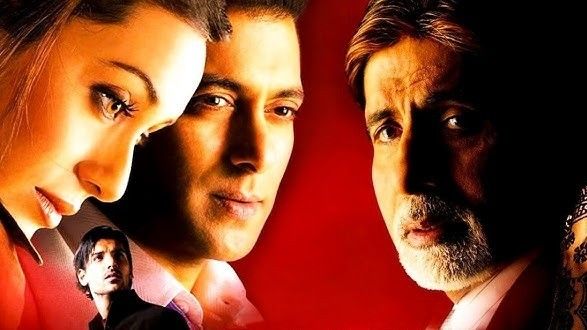
Ravi Chopra’s Baabul, on the theme of widow remarriage, was meant to be a follow-up blockbuster to the same team’s Baghban. Unfortunately, Baabul was not half the hit it was expected to be.
One of the highlights of Baabul was its leading man, Amitabh Bachchan, turning music composer.
Recalls Bachchan, “It was a tune from my past that kept playing in my mind. I just thought I’d use it here because it fitted in so well. I played around with the notes and came up with this song for Baabul. In Ravi Chopra’s Baghban, I had sung four numbers. In Baabul, I’ve recorded two. Earlier, I had recorded a happy number. But the pensive, somber number which I’ve just recorded is actually composed by me.”
The Big B still insists he isn’t much of a singer. “What I liked is meeting up with my much-missed friend, composer Aadesh Shrivastava, sitting around in his music room, and fooling around with the notes. In Baabul, for the first time, I contributed to a tune. Obviously, the orchestral arrangements are Aadesh’s, but the theme song, Kehta hoon babul o mere bitiya in Baabul, is tuned and sung by me. Earlier, in Baghban, two of the songs — the Holi song and also parts of Meri Makhna — were mine. But in Baabul, the full theme song (written by Sameer) is mine.”
The mega-star is glad that a film stressing Indian values was made. “Television is so full of family dramas that this genre is hardly attempted in today’s cinema. Baabul is very traditional and close to our hearts. It addresses the sensitive issue of widow remarriage. Why does a young widow become a victim of ridiculous customs, almost an outcast? Like all the films from B.R. Films, it addressed itself to a burning social issue.”

Speaking of his on-screen rapport with Hema Malini, AB says, “We did some films in our earlier days, but not as many as we’re doing now. In Baabul, she’s very much part of the drama. In Sholay, there was the effort to rehabilitate the widow. That sentiment continues in Baabul. It was initially tried in Dharamji and Meena Kumariji’s starrer Phool Aur Patthar. Now, widow remarriage is the theme in films like Water and Baabul. Good. Cinema needs to raise the collective conscience level of the audience.”
Speaking on his acutely striking bonding with Rani, the Big B says, “We’ve been cast in very unusual roles in Black. And then, in KANK, we were a very different kind of father-in-law and daughter-in-law. And now we play another very different and unusual father-in-law and daughter-in-law in Baabul. I guess we’re lucky to have our acting talents being tested in such unusual ways. I’m very fortunate to get such unusual opportunities. Rani is a terrific co-star, and it’s a pleasure to work with her. All of us—Jaya, Abhishek, and I—are very fond of her.”
He recalls Rani’s concern for his health on the sets. “She’s a very caring girl. And a thorough professional on camera.”
Mr Bachchan is rightly proud of Baabul. “I think it reclaimed many of our basic values…like Vivah, which I thought was a very sweet film. It just took me back to the days of innocence when romance was about exchanging looks. Baabul is also a film that’s embedded in our ethos and culture, though the issue here (widow rehabilitation) is far more serious. And the interesting thing about it is that the seeds of its plot were sown in Sholay many years ago… The relationship Rani shares with me does have similarities to what Jaya shared with Sanjeev Kumar in Sholay.”